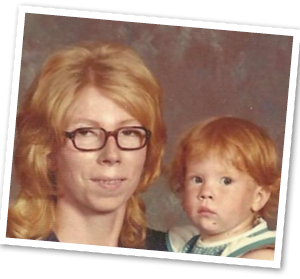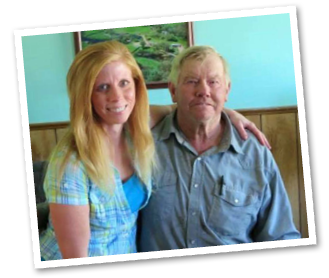 by Rebecca Anderson, RN
by Rebecca Anderson, RN
As a hospice nurse who has experienced parental loss, I draw on my personal experiences with the grief and loss of both my parents to offer guidance to the families I serve at Hospice of the Red River Valley.
 Just as each life is unique, so was the loss of each parent for me and the things I wish I would have been able to say before each of their passing.
Just as each life is unique, so was the loss of each parent for me and the things I wish I would have been able to say before each of their passing.
When I was three and a half years old, I lost my mother Terry to breast cancer when she was only 31 years old. This loss changed my life significantly, and I was left with feelings of fear and worry about losing others in my life.
At such a young age, I didn’t understand what took my mother away from me, and I couldn’t possibly have been able to express everything I felt at the time.
 Two years ago, I unexpectedly lost my dad Alan to a massive heart attack. Growing up without a mom during most of my childhood, I was a “Daddy’s girl.”
Two years ago, I unexpectedly lost my dad Alan to a massive heart attack. Growing up without a mom during most of my childhood, I was a “Daddy’s girl.”
I cherish the last conversation I had with him on his 79th birthday, just days prior to his death. I remember teasing him about his next birthday being his “big 8-0” and ending our conversation by telling him I loved him.
I had no way of knowing these would be the last words I would get to say to my father, but I feel blessed I told him I loved him in our last conversation together.
These deeply personal experiences have allowed me to connect and relate to families who are struggling with their loved one’s end of life. Although there will always be one more thing we wish we could have said to someone we loved so deeply, or someone who we had a challenging relationship with, there are ways we can allow ourselves a little grace after the death of a person who was close to us.

- Allow for acceptance of the situation. We tend to be the hardest on ourselves, especially during times of immense stress. Allow yourself to accept that you cannot go back in time or change what you did or did not say to the person who died.
- Express your thoughts. Many times we feel things or experience a weight in our heart after a loss. Find a way to express those feelings about the person who died. Write a letter to the person or journal about them.
- Spend time in a notable space. Spend time in a place where you feel “close” to your loved one and express how you feel in that space. Express your feelings out loud to them, or consider role playing with a trusted friend or professional.
- Forgive yourself. Try to release yourself from guilt and regret. There’s an old saying: “When we know better, we do better.” It can be applied to a situation where things were left unsaid. When you reflect on any relationship in your life, you can most likely identify something you could have said or done differently. But in nearly all cases, we do the best we can with the knowledge we have at the time. Allow yourself the grace to know you did the best you could in that particular situation.
- Go forth and do differently. You cannot change the past, but you can use your previous experiences and feelings to change how you communicate with the important people who are still in your life.
My experiences have shaped the person I am today and the work I do as a hospice nurse. Oftentimes, I can relate to the feelings people have when they are losing a loved one. I have felt similar pain and can empathize and understand families whose journeys I am honored to be a part of at Hospice.
I encourage families be present and in the moment with the person who is dying and share their thoughts and feelings now so they have fewer regrets and less guilt later on.
If you or someone you know is grieving, we encourage you to take advantage of the groups, classes or individual support we offer through our bereavement department. For more information, please call 800-237-4629 and ask for the bereavement department, or visit our website.
Rebecca Anderson is a registered nurse with Hospice of the Red River Valley.
About Hospice of the Red River Valley
In 1981, Hospice of the Red River Valley was founded on the belief that everyone deserves access to high-quality end-of-life care. We fulfill our nonprofit mission by providing medical, emotional, personal and spiritual care, as well as grief support to our patients, their families and caregivers during a tender time in life. Our staff helps those we serve experience more meaningful moments through exceptional hospice care, 24 hours a day, 365 days a year, wherever a patient calls home. The organization serves more than 40,000 square miles in North Dakota and Minnesota, including in and around Bismarck, Detroit Lakes, Devils Lake, Fargo, Fergus Falls, Grand Forks, Lisbon, Thief River Falls, Valley City and many more communities. Hospice of the Red River Valley offers round-the-clock availability via phone, prompt response times and same-day admissions, including evenings, weekends and holidays. Contact us anytime at 800-237-4629 or hrrv.org.



